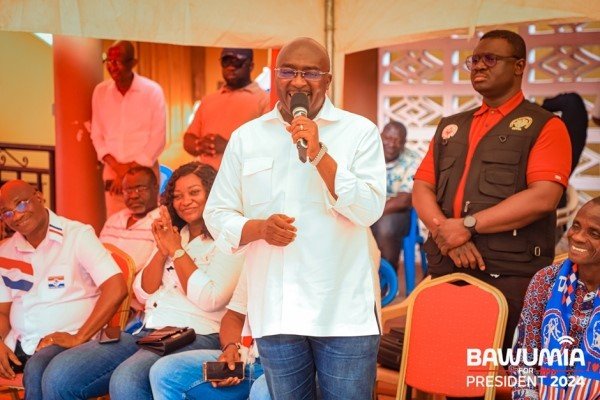News
Bawumia announces plan to introduce solar-powered outboard motors to curb premix fuel issues

The Vice President and flagbearer of the NPP, Dr. Mahamudu Bawumia, has announced what he has called, a bold solution to ending the age-old problems over premix fuel for fisherfolks.
Speaking at Saltpond in the Mfantseman constituency during his on-going campaign tour of the Central Region, Dr. Bawumia said, after many attempts to deal with the issue of premix fuel for fisherfolks, including the setting up of automated dispensing machines at various landing beaches and fishing communities, which have not completely dealt with the issue, he has come up with a new. bold solution – the introduction of solar-powered outboard motors, which he stressed, will permanently address the problem.
“When we came into office, we brought premix automation. And in Mfantseman here and other places, we have pre mix automation machines. But when you look at the premix problems, we have not addressed all. We still have problems with the premix so I have been thinking a lot and discussing how we are going to solve the problem permanently,” Dr. Bawumia said.
“We need a permanent solution to this problem because every time we move, we don’t solve the problem permanently. So I have finished some discussions and by God’s grace, I believe we have a permanent solution to this problem,” Dr. Bawumia said, amidst loud cheers of endorsement.
He stressed, “I want us to move away from the dependence on premix fuel to solar power for the boats. Let’s go for solar power to power the boats. So, before the end of this year, we are going to pilot the solar power outboard motors.”
According to him, “With this, we will make the outboard motors available to the fishermen and they don’t need to buy premix anymore. Once the sun is shining, their batteries will be charging and they can go across.”
Dr. Bawumia added that once the fisherfolks get the solar powered outboard motors, there will no longer be the need to buy pre mix fuel to power outboard motors.
“We will have meetings with the fishermen on this in the next few weeks and the pilot programme will take place next month and we will start a whole new regime for fisherfolks because there is too much ‘kululu’ (fraud) in the premix matter,” he said.
“We will take them out of the way and we will give the fisherfolk outboard motors powered by solar and then we will solve the problem.”
Dr. Bawumia’s announcement attracted wild cheers from the crowd, which included members of the fishing community in Saltpond and surrounding villages.
The piloting of the solar powered outboard motors, Dr. Bawumia stated, will start most likely next month, so that the fisherfolks can be shown how it works.
News
Man sentenced to 25 years for robbery at Manso Akwasiso

A 30-year-old man has been sentenced to 25 years imprisonment with hard labour by the Bekwai Circuit Court for his role in a 2022 robbery at a mining site at Manso Akwasiso in the Ashanti South Region.
The convict, Dominic Ofori, also known as Fanta, was arrested on 16th February 2026 after years on the run. He pleaded guilty before the Bekwai Circuit Court to robbery contrary to Section 149 of the Criminal Offences Act, 1960 Act 29, and was accordingly sentenced to 25 years imprisonment with hard labour.
On March 20, 2022, the Manso Adubia District Police received intelligence that a group of armed men from Manso Abodom were planning to attack a mining site at Manso Akwasiso to rob the owner of gold concentrate. Acting on the information, police mounted a coordinated operation and laid an ambush at the site.
At about 5:30 pm the same day, four-armed men arrived at the site, fired indiscriminately, and robbed the miners of their gold concentrate. The police team on surveillance intervened, resulting in an exchange of gunfire.
Three of the suspects, Abu Abubakar, Musah Latif, and Gideon Takyi, sustained gunshot wounds and were pronounced dead on arrival at St Martins Catholic Hospital at Agroyesum. Dominic Ofori escaped at the time but was later arrested and put before the court.
The Ashanti South Regional Police Command has assured the public of its continued commitment to combating violent crimes and bringing offenders to justice.
News
Ashanti police arrest man for publishing false news on TikTok

The Ashanti Regional Police Command has arrested 45-year-old Isaac Boafo, also known as “Duabo King,” for allegedly publishing false news intended to cause fear and panic.
Police said the arrest follows a viral TikTok video in which Boafo claimed that four officers at the Central Police Station in Kumasi engaged in inappropriate conduct with commercial sex workers during night patrols in Asafo.
Officers from the Police Intelligence Directorate (Ashanti Region) apprehended Boafo after receiving intelligence about the video.
During questioning, he admitted to creating the video to attract views and engagement online, and acknowledged that he could not prove the allegations.
Boafo also admitted making comments about the President of the Republic for content purposes and could not defend those statements.
He has been formally charged and is in detention as investigations continue.
The Ashanti Regional Police have warned the public against publishing or sharing false information on social media, noting that such acts can cause fear, panic, and damage reputations.
They said anyone found engaging in similar conduct will face legal action.
By: Jacob Aggrey








